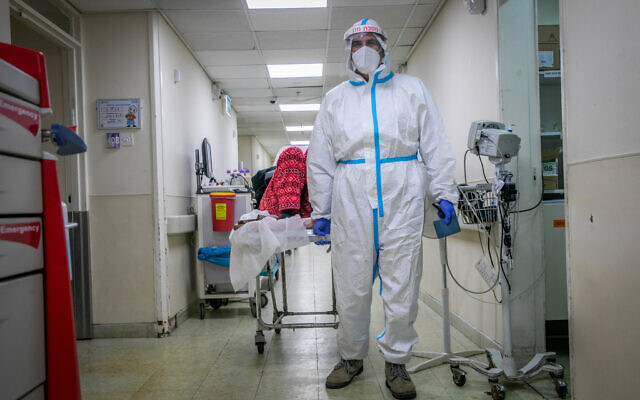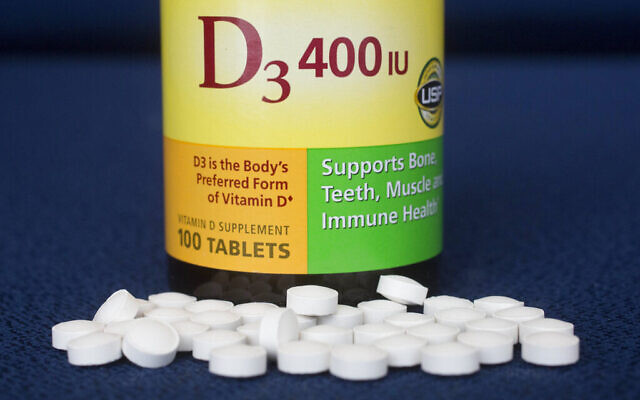- Bolstering previous research, scientists publish ‘remarkable’ data showing strong link between vitamin deficiency, prevalent in Israel, and death or serious illness among patients
Israel scientists say they have gathered the most convincing evidence to date that increased vitamin D levels can help COVID-19 patients reduce the risk of serious illness or death.
Researchers from Bar Ilan University and the Galilee Medical Center say that the vitamin has such a strong impact on disease severity that they can predict how people would fare if infected based on nothing more than their ages and vitamin D levels.
Lacking vitamin D significantly increases danger levels, they concluded in newly peer-reviewed research published Thursday in the journal PLOS One.
The study is based on research conducted during Israel’s first two waves of the virus, before vaccines were widely available, and doctors emphasized that vitamin supplements were not a substitute for vaccines, but rather a way to keep immunity levels from falling.
Vitamin D deficiency is endemic across the Middle East, including in Israel, where nearly four in five people are low on the vitamin, according to one study from 2011. By taking supplements before infection, though, the researchers in the new Israeli study found that patients could avoid the worst effects of the disease.
“We found it remarkable, and striking, to see the difference in the chances of becoming a severe patient when you are lacking in vitamin D compared to when you’re not,” said Dr. Amiel Dror, a Galilee Medical Center physician and Bar Ilan researcher who was part of the team behind the study. Dr. Amiel Dror (via Twitter)
He noted that his study was conducted pre-Omicron, but said that the coronavirus doesn’t change fundamentally enough between variants to negate vitamin D effectiveness.
“What we’re seeing when vitamin D helps people with COVID infections is a result of its effectiveness in bolstering the immune systems to deal with viral pathogens that attack the respiratory system,” he told The Times of Israel. “This is equally relevant for Omicron as it was for previous variants.”
Health authorities in Israel and several other countries have recommended vitamin D supplements in response to the coronavirus pandemic, though data on its effectiveness has been sparse until now. Hospital staff wear safety gear as they work in a coronavirus ward of Kaplan Medical Center in Rehovot, on January 18, 2022. (Yossi Aloni/Flash90)
Hospital staff wear safety gear as they work in a coronavirus ward of Kaplan Medical Center in Rehovot, on January 18, 2022. (Yossi Aloni/Flash90)
In June, researchers published preliminary findings showing that 26 percent of coronavirus patients died if they were vitamin D deficient soon before hospitalization, compared to 3% who had normal levels of vitamin D.
They also determined that hospitalized patients who were vitamin D deficient were 14 times more likely, on average, to end up in severe or critical condition than others.
While the scientific community recognized the importance of the results, questions arose as to whether recent health conditions among the patients might have been skewing the results.
The possibility was raised that patients could have been suffering from conditions that both reduce vitamin D levels and increase vulnerability to serious illness from COVID-19, meaning the vitamin deficiency would be a symptom rather than a contributing factor in disease severity. Vitamin D pills. (AP Photo/Mark Lennihan)
Vitamin D pills. (AP Photo/Mark Lennihan)
To zero out that possibility, Dror’s team delved deeper into the data, examining each of its patients’ vitamin D levels over the two-year stretch before coronavirus infection. They found that the strong correlation between sufficient vitamin D levels and ability to fight the coronavirus still held, and the level of increased danger in their preliminary findings remained almost identical.
“We checked a range of timeframes, and found that wherever you look over the two years before infection, the correlation between vitamin D and disease severity is extremely strong,” Dror said.
“Because this study gets such a good picture of patients’ vitamin D levels, by looking at a wide timeframe instead of just the time around hospitalization, it offers much stronger support than anything seen so far emphasizing the importance of boosting vitamin D levels during the pandemic,” he added.
A flood of dubious claims about natural remedies to the coronavirus, including a theory that Israelis had immunized themselves with lemons and baking soda, have left some skeptical about claims of vitamins warding off the virus.
But Dror insisted that his team’s research showed that the importance of vitamin D was not based on incomplete or flawed data.
“People should learn from this that studies pointing to the importance of taking vitamin D are very reliable, and aren’t based on skewed data,” he said. “And it emphasizes the value of everyone taking a vitamin D supplement during the pandemic, which, consumed in sensible amounts in accordance with official advice, doesn’t have any downside.”
First published in Times of Israel





